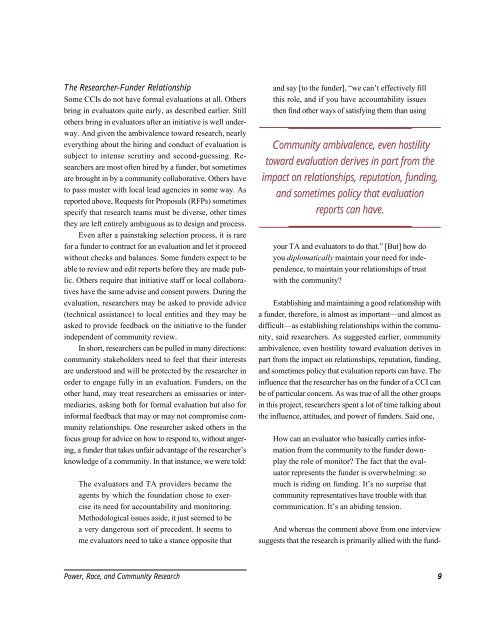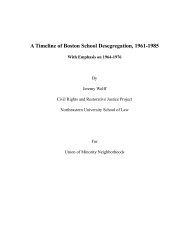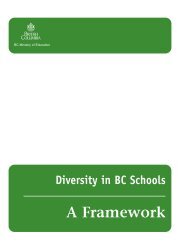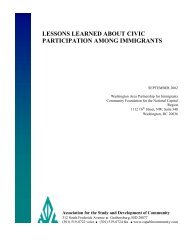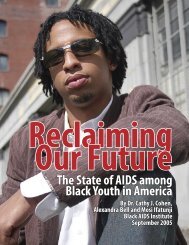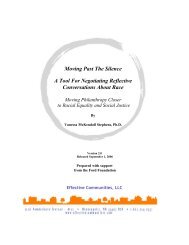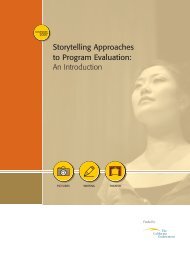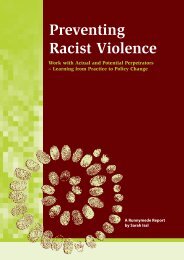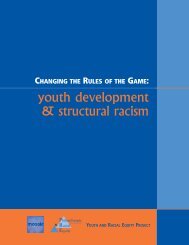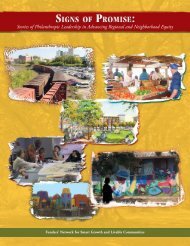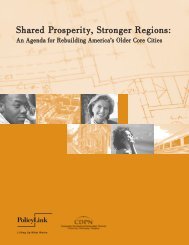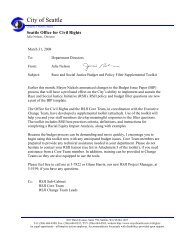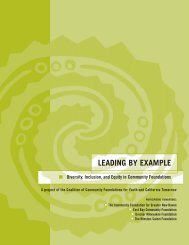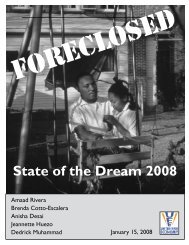Core Issues in Comprehensive Community-Building Initiatives ...
Core Issues in Comprehensive Community-Building Initiatives ...
Core Issues in Comprehensive Community-Building Initiatives ...
Create successful ePaper yourself
Turn your PDF publications into a flip-book with our unique Google optimized e-Paper software.
The Researcher-Funder Relationship<br />
Some CCIs do not have formal evaluations at all. Others<br />
br<strong>in</strong>g <strong>in</strong> evaluators quite early, as described earlier. Still<br />
others br<strong>in</strong>g <strong>in</strong> evaluators after an <strong>in</strong>itiative is well underway.<br />
And given the ambivalence toward research, nearly<br />
everyth<strong>in</strong>g about the hir<strong>in</strong>g and conduct of evaluation is<br />
subject to <strong>in</strong>tense scrut<strong>in</strong>y and second-guess<strong>in</strong>g. Researchers<br />
are most often hired by a funder, but sometimes<br />
are brought <strong>in</strong> by a community collaborative. Others have<br />
to pass muster with local lead agencies <strong>in</strong> some way. As<br />
reported above, Requests for Proposals (RFPs) sometimes<br />
specify that research teams must be diverse, other times<br />
they are left entirely ambiguous as to design and process.<br />
Even after a pa<strong>in</strong>stak<strong>in</strong>g selection process, it is rare<br />
for a funder to contract for an evaluation and let it proceed<br />
without checks and balances. Some funders expect to be<br />
able to review and edit reports before they are made public.<br />
Others require that <strong>in</strong>itiative staff or local collaboratives<br />
have the same advise and consent powers. Dur<strong>in</strong>g the<br />
evaluation, researchers may be asked to provide advice<br />
(technical assistance) to local entities and they may be<br />
asked to provide feedback on the <strong>in</strong>itiative to the funder<br />
<strong>in</strong>dependent of community review.<br />
In short, researchers can be pulled <strong>in</strong> many directions:<br />
community stakeholders need to feel that their <strong>in</strong>terests<br />
are understood and will be protected by the researcher <strong>in</strong><br />
order to engage fully <strong>in</strong> an evaluation. Funders, on the<br />
other hand, may treat researchers as emissaries or <strong>in</strong>termediaries,<br />
ask<strong>in</strong>g both for formal evaluation but also for<br />
<strong>in</strong>formal feedback that may or may not compromise community<br />
relationships. One researcher asked others <strong>in</strong> the<br />
focus group for advice on how to respond to, without anger<strong>in</strong>g,<br />
a funder that takes unfair advantage of the researcher’s<br />
knowledge of a community. In that <strong>in</strong>stance, we were told:<br />
The evaluators and TA providers became the<br />
agents by which the foundation chose to exercise<br />
its need for accountability and monitor<strong>in</strong>g.<br />
Methodological issues aside, it just seemed to be<br />
a very dangerous sort of precedent. It seems to<br />
me evaluators need to take a stance opposite that<br />
and say [to the funder], “we can’t effectively fill<br />
this role, and if you have accountability issues<br />
then f<strong>in</strong>d other ways of satisfy<strong>in</strong>g them than us<strong>in</strong>g<br />
<strong>Community</strong> ambivalence, even hostility<br />
toward evaluation derives <strong>in</strong> part from the<br />
impact on relationships, reputation, fund<strong>in</strong>g,<br />
and sometimes policy that evaluation<br />
reports can have.<br />
your TA and evaluators to do that.” [But] how do<br />
you diplomatically ma<strong>in</strong>ta<strong>in</strong> your need for <strong>in</strong>dependence,<br />
to ma<strong>in</strong>ta<strong>in</strong> your relationships of trust<br />
with the community?<br />
Establish<strong>in</strong>g and ma<strong>in</strong>ta<strong>in</strong><strong>in</strong>g a good relationship with<br />
a funder, therefore, is almost as important—and almost as<br />
difficult—as establish<strong>in</strong>g relationships with<strong>in</strong> the community,<br />
said researchers. As suggested earlier, community<br />
ambivalence, even hostility toward evaluation derives <strong>in</strong><br />
part from the impact on relationships, reputation, fund<strong>in</strong>g,<br />
and sometimes policy that evaluation reports can have. The<br />
<strong>in</strong>fluence that the researcher has on the funder of a CCI can<br />
be of particular concern. As was true of all the other groups<br />
<strong>in</strong> this project, researchers spent a lot of time talk<strong>in</strong>g about<br />
the <strong>in</strong>fluence, attitudes, and power of funders. Said one,<br />
How can an evaluator who basically carries <strong>in</strong>formation<br />
from the community to the funder downplay<br />
the role of monitor? The fact that the evaluator<br />
represents the funder is overwhelm<strong>in</strong>g: so<br />
much is rid<strong>in</strong>g on fund<strong>in</strong>g. It’s no surprise that<br />
community representatives have trouble with that<br />
communication. It’s an abid<strong>in</strong>g tension.<br />
And whereas the comment above from one <strong>in</strong>terview<br />
suggests that the research is primarily allied with the fund-<br />
Power, Race, and <strong>Community</strong> Research 9


